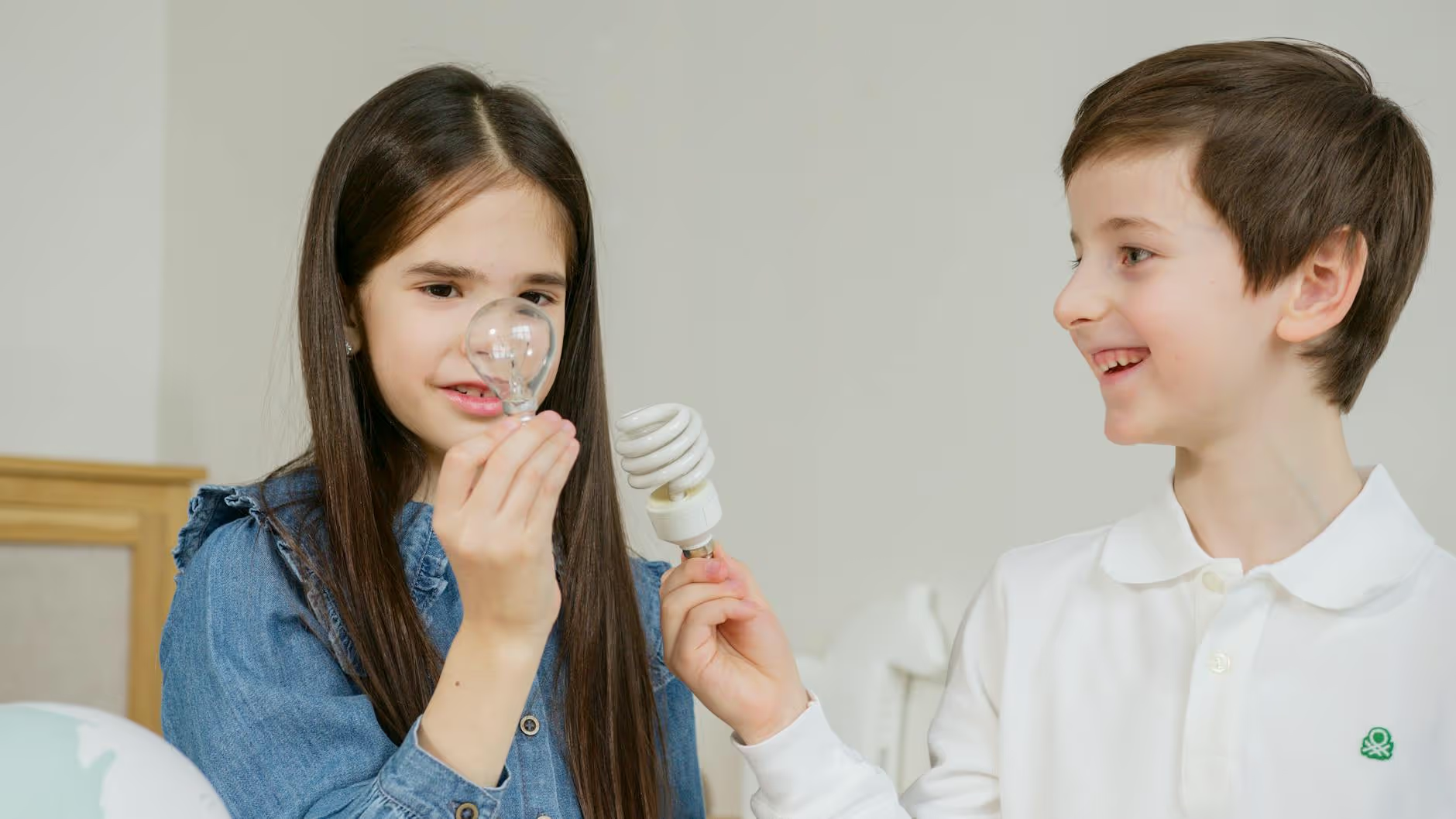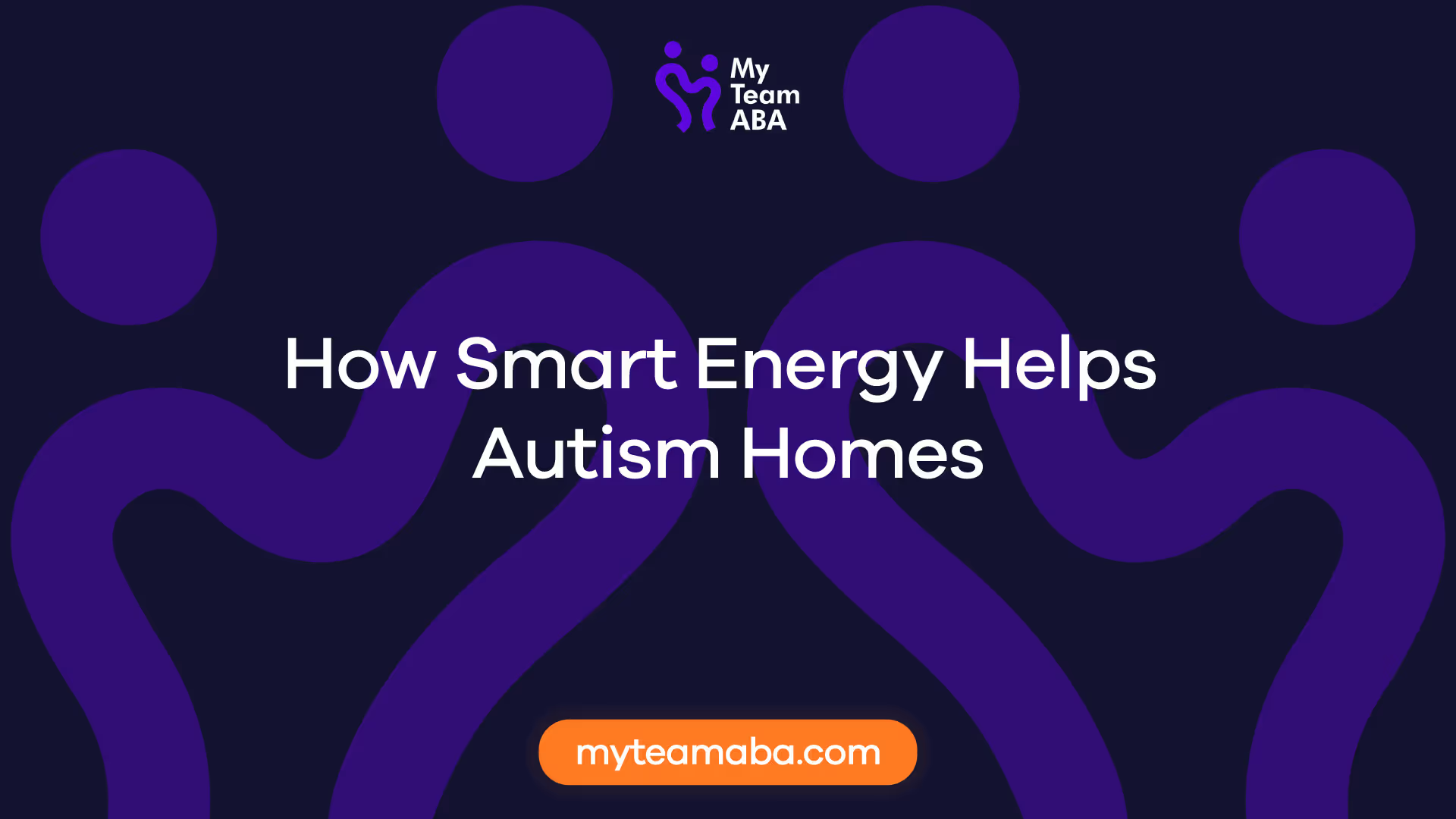How Smart Energy Helps Autism Homes
March 3, 2025
Discover how smart energy transforms autism homes, from creating calming atmospheres to enhancing communication abilities.

Smart Energy for Autism Families
Investing in smart energy solutions can significantly impact the lives of families with autism, creating environments that prioritize comfort and sustainability. By enhancing home environments and supporting autism day programs, smart energy initiatives can make a positive difference in the daily lives of individuals with autism and their families.

Enhancing Home Environments
One way smart energy can benefit autism families is through the integration of innovative technologies like smart thermostats. According to My Team ABA, smart thermostats can be tailored to meet the specific needs of individuals with autism, ensuring a comfortable living space that promotes a sense of calm and stability. By providing precise temperature control and personalized settings, these devices contribute to creating an autism-friendly home environment that enhances overall well-being.
Additionally, energy-efficient homes designed with sustainability in mind offer numerous benefits for autism families. These homes are customized to meet the unique needs of individuals with autism, providing a comfortable and energy-saving living space. By incorporating features such as efficient insulation, energy-saving appliances, and renewable energy sources, families can reduce energy costs while minimizing their environmental impact.
Supporting Autism Day Programs
Smart energy solutions extend beyond the home environment and can also benefit autism day programs. By harnessing renewable energy sources like solar power, these programs can operate more sustainably and reduce their carbon footprint. According to My Team ABA, solar energy can be particularly beneficial for autism care facilities in Pennsylvania and Georgia, showcasing the advantages of clean and renewable energy in supporting neurodiverse communities.
Renewable energy not only promotes environmental sustainability but also contributes to cost savings for autism day programs. By investing in energy-efficient technologies and adopting eco-friendly practices, these programs can allocate more resources to providing quality care and support for individuals with autism.
By integrating smart energy practices in both home environments and autism day programs, families and individuals with autism can enjoy improved comfort, reduced energy costs, and a more sustainable future. Through the optimization of energy efficiency and the adoption of renewable energy sources, the impact of smart energy on autism families is not only practical but also profound in enhancing overall quality of life.
Sustainable Energy Solutions
In the realm of energy-saving tips for autism families, sustainable energy solutions play a pivotal role in optimizing home environments for individuals with autism. Two key components of sustainable energy solutions are solar energy benefits and the creation of eco-friendly spaces.
Solar Energy Benefits
Solar energy, a renewable and clean energy source, holds immense potential for transforming the way energy is utilized in autism care facilities and homes. By harnessing the power of the sun, solar panels can generate electricity that is not only environmentally friendly but also cost-effective in the long run.
In the context of autism care facilities located in Pennsylvania and Georgia, the integration of solar energy systems can bolster sustainability efforts and reduce reliance on traditional energy sources. As highlighted by My Team ABA, solar energy can play a significant role in optimizing energy consumption, showcasing the benefits of clean and renewable energy sources.
Eco-Friendly Spaces
Blending sustainability with sensory-friendly design principles, the concept of eco-friendly spaces for autism emphasizes the creation of environments that cater to the unique needs of individuals on the autism spectrum. These spaces are crafted to promote comfort, well-being, and environmental consciousness simultaneously.
By incorporating elements such as natural lighting, non-toxic materials, and energy-efficient appliances, eco-friendly spaces support the sensory sensitivities of individuals with autism while also reducing the ecological footprint of the living environment. The combination of sustainability and sensory considerations not only enhances the physical space but also contributes to the overall well-being of its occupants.
When striving to establish energy-efficient solutions for autism support, the amalgamation of solar energy benefits and the development of eco-friendly spaces can lead to a holistic approach that fosters comfort, sustainability, and a more inclusive living environment for individuals with autism and their families.
Energy-Efficient Homes
Efficiently managing energy consumption in homes can have significant benefits for families living with autism. By customizing homes with energy-efficient features, not only can comfort levels be enhanced, but energy costs can also be reduced, contributing to a more sustainable future.
Benefits for Autism Families
Energy-efficient homes tailored for autism families provide a range of benefits that positively impact daily living. Smart thermostats, designed with the specific needs of individuals with autism in mind, can create a more comfortable indoor environment and aid in managing time and tasks efficiently. These thermostats offer the flexibility needed to adjust temperature settings according to individual preferences, promoting a sense of control and routine.
Individuals with autism often benefit from a calming environment with minimal stimuli to help regulate energy levels. By incorporating energy-efficient practices, such as reducing energy consumption, optimizing lighting, and ensuring proper insulation, homes can be transformed into spaces that promote relaxation and focus. This, coupled with regular exercise, a balanced diet, and sufficient rest, can further support individuals with autism in managing their energy levels effectively [2].
Customization for Comfort
Optimizing the efficiency of Heating, Ventilation, and Air Conditioning (HVAC) systems is essential in energy-efficient homes for autism families. Utilizing programmable thermostats and implementing proper insulation can lead to significant energy conservation, cost savings, and a more comfortable living environment [2].
Incorporating smart home devices such as smart door locks, lighting systems, video doorbells, garage door openers, and air conditioners can offer increased security, predictability, independence, and comfort for individuals with autism. These devices not only enhance the functionality of the home but also provide a sense of control and autonomy to the residents.
By prioritizing energy efficiency and customization for comfort in homes designed for autism families, it is possible to create living spaces that not only cater to the unique needs of individuals with autism but also contribute to a sustainable and supportive environment for daily living.
Therapies and Time Management
Effectively managing time and organizing tasks are crucial aspects in the lives of individuals with autism. By implementing specific therapies and organizational strategies, it is possible to enhance time management skills and promote better organization. Let's explore how therapies and strategies play a vital role in supporting individuals with autism in these areas.
Enhancing Time Management
Therapies such as occupational therapy, speech therapy, and Applied Behavior Analysis (ABA) can play a significant role in helping individuals with autism develop essential time management skills [1]. These therapies focus on enhancing executive functioning skills, including time management, organization, and task prioritization, which are essential for daily living and independent functioning.
Implementing structured work systems (SWSs) is another effective strategy to support individuals with autism in managing their time effectively. SWSs provide visual cues and guidance to help individuals organize tasks, stay focused, and complete activities successfully. By breaking down tasks into manageable steps, SWSs promote independence and improve time management skills.
Visual organization tools and planning strategies, such as daily checklists, personal schedules, sticky notes, and timers, can significantly enhance time management skills in individuals with autism. These tools help individuals structure their day, prioritize tasks, and stay on track with their routines. By providing visual cues and reminders, these strategies improve organization and support effective time management.
Understanding the challenges individuals with autism face in time perception is critical to developing strategies that support their time management skills [1]. Difficulties with time sensitivity and prospective timing can impact daily functioning and organizational skills. By recognizing these challenges, caregivers and therapists can tailor interventions to address individual needs and promote successful time management.
Organizational Strategies
In addition to therapies, incorporating organizational strategies can further enhance time management skills and support individuals with autism in daily tasks. Structured routines and clear expectations help create a sense of stability and predictability, which is beneficial for individuals with autism.
By establishing consistent schedules and routines, individuals with autism can develop a sense of structure and predictability in their day-to-day activities. This predictability reduces anxiety and promotes a sense of control over their environment, enhancing their ability to manage time effectively.
Organizational tools such as visual schedules, task boards, and color-coded systems can aid in organizing tasks and highlighting priorities for individuals with autism. These tools provide visual support and cues that assist in task initiation, completion, and transitioning between activities, fostering independence and autonomy.
By combining therapies focused on time management skills with effective organizational strategies, individuals with autism can improve their ability to plan, prioritize, and manage tasks efficiently. These interventions empower individuals with autism to navigate daily challenges with confidence and independence, contributing to their overall well-being and success in daily life.
Smart Home Technology Advantages
In the realm of energy-saving tips for autism families, smart home technology plays a crucial role in enhancing the living environment for individuals on the autism spectrum. By incorporating smart devices and automated systems, homes can be transformed into spaces that are both comforting and empowering. This section explores two key advantages of smart home technology: creating calming atmospheres and promoting autonomy.
Creating Calming Atmospheres
Smart home technology offers a myriad of customizable features that can be tailored to meet the unique sensory needs of individuals with autism. With the ability to adjust lighting, temperature, and sound levels, caregivers can create environments that promote relaxation and reduce sensory overload. This is particularly beneficial for bedtime routines, as a soothing transition to sleep is essential for many individuals on the autism spectrum. By utilizing smart lighting systems and sound controls, homes can be transformed into calming sanctuaries that foster restful sleep and overall well-being.
Moreover, the routine support provided by smart home technology extends to visual schedules, reminders, and prompts for daily tasks and activities. These features not only aid in time management but also enhance independence and ensure that important tasks are completed efficiently and on time. This routine support helps individuals with autism navigate their daily lives with confidence and structure, promoting a sense of security and stability within the home environment.
Promoting Autonomy
Smart devices such as digital door locks, lighting systems, video doorbells, garage door openers, and air conditioners offer a range of benefits for individuals on the autism spectrum. The predictability and security provided by these devices contribute to increased independence and comfort within the home. By enabling easy and secure access to different areas of the home, smart technology empowers individuals to navigate their living space with confidence and autonomy.
Smart home assistants, equipped with voice-activated controls, serve as valuable companions by providing hands-free management of the home environment. These devices help reduce sensory stress, automate daily routines, and remind individuals of tasks and appointments. By incorporating smart assistants into the household, individuals with autism can navigate their daily schedules with ease, enhancing their sense of control and personal agency.
In conclusion, smart home technology offers a range of advantages for autism homes, from creating calming atmospheres to promoting autonomy. By leveraging the innovative features of smart devices, individuals on the autism spectrum can enjoy enhanced comfort, security, and independence within their living spaces. The integration of smart technology facilitates a more supportive and inclusive environment for individuals with autism, empowering them to lead fulfilling and self-directed lives.
Assistive Communication Devices
In the realm of autism care, assistive communication devices play a vital role in enhancing the communication abilities of individuals on the autism spectrum. These devices leverage advances in Augmentative and Alternative Communication (AAC) technology to offer solutions that facilitate communication, bridging the communication gap that may exist for those with autism.
Enhancing Communication Abilities
Assistive communication devices provide individuals with autism a means to express themselves effectively, whether verbally or non-verbally. These devices can take various forms, including picture communication boards, speech-generating devices, and mobile applications designed to support communication needs.
By using assistive communication devices, individuals with autism can convey their thoughts, feelings, and needs more clearly, reducing frustration and promoting meaningful interactions with caregivers, peers, and educators. These devices act as valuable tools in helping individuals with autism navigate social interactions and express themselves in diverse settings.
Bridging Communication Gaps
The innovative features of assistive communication devices help bridge communication gaps that individuals with autism may encounter in their daily lives. These devices offer customizable options that cater to the unique needs and preferences of each individual, ensuring that communication methods align with their communication style.
Moreover, assistive communication devices empower individuals with autism to participate more actively in social settings, educational environments, and day-to-day interactions. By enhancing their ability to communicate effectively, these devices contribute to fostering independence, boosting self-confidence, and promoting inclusion within their communities.
Integrating assistive communication devices into the daily routines of individuals with autism not only facilitates communication but also fosters their overall development and well-being. These devices serve as powerful tools in empowering individuals with autism to navigate the world with confidence and establish meaningful connections with those around them.
Optimizing Energy Efficiency
Efficient management of energy plays a vital role in creating comfortable and sustainable living environments, especially for autism families. Optimizing energy efficiency not only reduces costs but also enhances the overall well-being of individuals. Two key aspects of energy efficiency for autism homes are HVAC system efficiency and the resulting cost savings and comfort.
HVAC Systems Efficiency
When it comes to creating a conducive environment for individuals with autism, maintaining a comfortable temperature is crucial. HVAC (Heating, Ventilation, and Air Conditioning) systems not only regulate temperature but also ensure proper air quality. By optimizing the efficiency of HVAC systems, homes can provide a consistent and comfortable indoor climate, promoting a sense of security and stability for individuals with autism.
Improving the efficiency of HVAC systems involves regular maintenance, such as cleaning or replacing filters, checking ductwork for leaks, and scheduling professional inspections. Additionally, installing programmable thermostats can help customize temperature settings based on daily routines and preferences. Smart thermostats, tailored for autism needs, can further enhance home environments and comfort levels, aiding individuals in managing time and tasks more efficiently [1].
Cost Savings and Comfort
Efficient HVAC systems not only contribute to comfort but also lead to cost savings in the long run. By ensuring that heating and cooling systems operate at peak efficiency, families can reduce energy consumption and lower utility bills. This financial relief can be significant for autism families who may already have additional expenses related to specialized care and therapies.
Moreover, by implementing energy-efficient practices and technologies, such as smart thermostats and energy-efficient appliances, homes can reduce their environmental impact. Sustainable energy solutions, particularly solar energy, offer benefits not only in terms of cost savings but also in promoting eco-friendly practices. Solar energy can be particularly beneficial for autism care facilities in states like Georgia and Pennsylvania, optimizing sustainability and supporting clean and renewable energy sources [4].
In summary, focusing on optimizing energy efficiency in HVAC systems can not only enhance comfort and well-being for individuals with autism but also contribute to cost savings and environmental sustainability. By incorporating smart energy practices tailored to the unique needs of autism families, homes can create a nurturing and supportive environment that prioritizes both comfort and efficiency.
The Impact of Smart Home Devices
The incorporation of smart home devices can have a profound impact on enhancing the living environment for individuals with autism. These devices offer personalized features and routine support, fostering autonomy and promoting a sense of independence within the home setting.
Personalized Features
Smart home technology provides a plethora of customizable features that can be tailored to meet the unique sensory needs of individuals with autism. Caregivers and family members can adjust lighting, temperature, and sound levels to create a calming atmosphere, crucial for individuals on the autism spectrum. These personalized settings aid in promoting relaxation and comfort, facilitating a smoother transition for activities such as bedtime, which is often challenging for individuals with autism.
By allowing for personalized adjustments, smart home devices empower individuals with autism to feel more at ease in their living spaces. Features such as dimmable lights, adjustable thermostats, and sound controls can help regulate the sensory experience, creating a more accommodating environment that caters to the unique preferences of each individual.
Routine Support and Autonomy
Smart home technology plays a pivotal role in providing routine support to individuals with autism through visual schedules, reminders, and prompts for daily activities. These tools help in structuring daily routines and tasks, ensuring that important activities are completed efficiently and on time. By offering visual cues and auditory prompts, smart home devices assist individuals with autism in navigating their daily responsibilities and maintaining a sense of independence.
Moreover, smart home assistants can facilitate hands-free control of the living environment, reducing sensory stress and enhancing daily routines through automated tasks and reminders. By empowering individuals with autism to manage their living spaces with greater ease and autonomy, these devices contribute to a more comfortable and secure home environment. The integration of smart home devices enables individuals to live more confidently and independently, fostering a sense of empowerment and self-reliance within their living environment [3].
In conclusion, the personalized features and routine support offered by smart home devices contribute significantly to improving the quality of life for individuals with autism. By creating a safe, manageable, and accommodating living environment, these technologies play a crucial role in enhancing independence, comfort, and overall well-being for individuals on the autism spectrum.
References
[2]:
[3]:
[4]:
